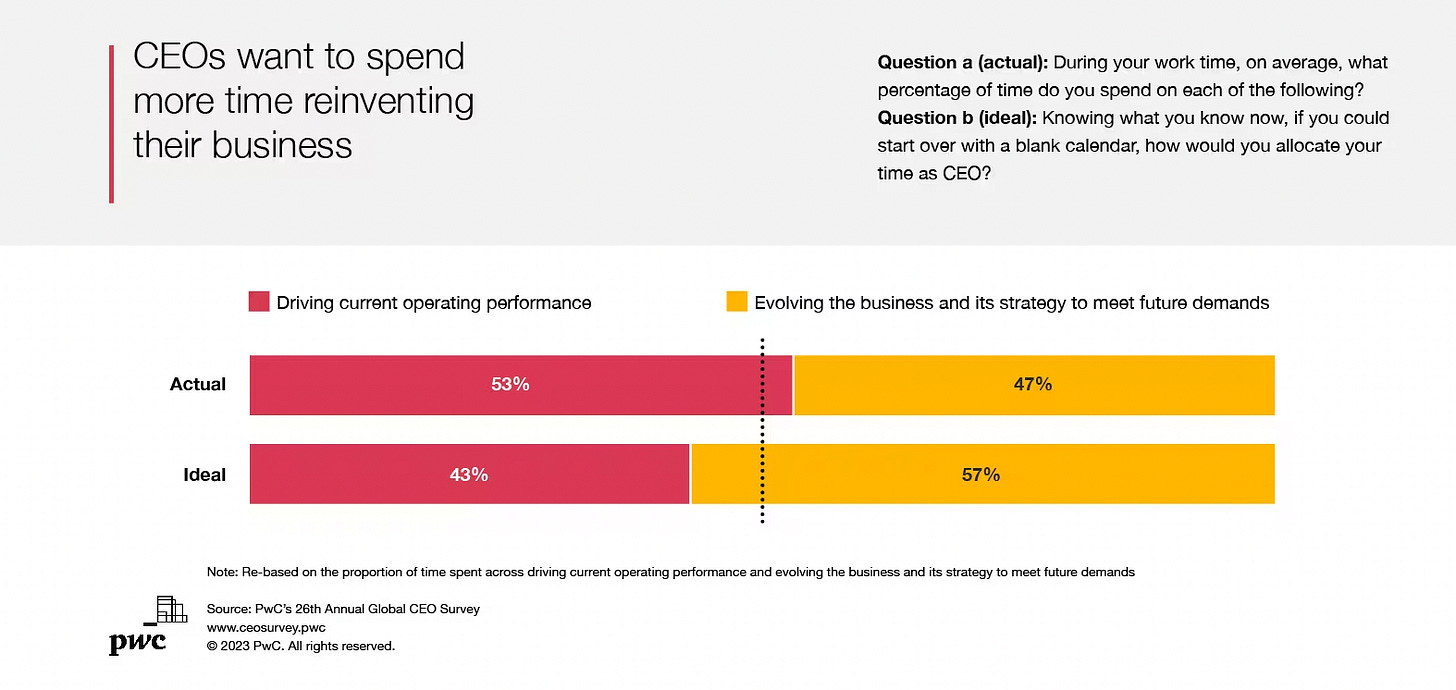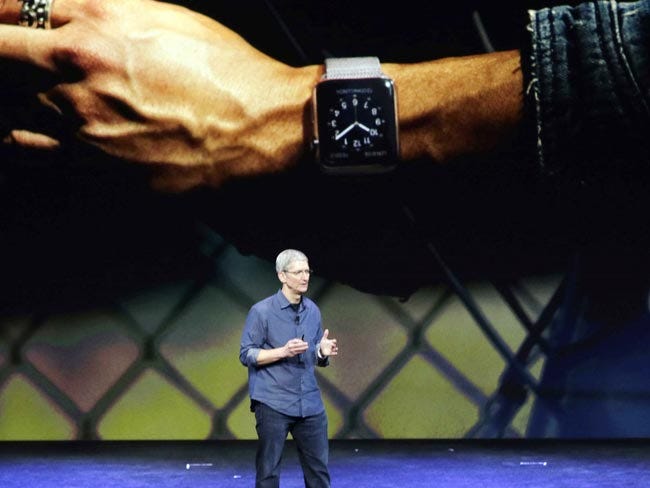Pessimism Won't Save You, Possibilities Will
How we see the world, the signals we leverage, and the stories we propagate in society matter. This week we explore those themes.
The Next Big Think!
As a reminder, we will keep it simple and send you one number, two insights, and three links to keep you ahead of societal shifts.
1 Number
#DisappearingBusinesses
Nearly 4 in 10 CEOs don’t think their companies will be economically viable a decade from now if they continue on their current path.
Why pay attention? CEOs state “changing customer demand/preferences” as the top issue impacting their profitability in the next decade. Strategically getting ahead of consumer preferences and desires should be considered a business mandate.
Source: PwC’s 2023 Annual Global CEO survey
2 Insights
#1. Focus Counts: Shifting Pessimists Into Possibilist
What:
Two people walk into a bar; one tells you how great the world will be, while the other warns you that the world will get worse- who do we pay attention to? In all likelihood, the pessimist.
Morgan Housel covers this topic in his book, The Psychology of Money
“Optimism sounds like a sales pitch. Pessimism sounds like someone is trying to help you. Pessimism isn’t just more common than optimism. It also sounds smarter. ”
Right now, listening to the pessimist is easy, and being one is tempting. The world feels like it’s falling apart all at once. We see in our data, hear it in the field, and discuss it in leadership sessions. Pessimism follows our neurological wiring to protect ourselves and our families, but it’s a defective compass to navigate the future.
In a recent Tim Ferris interview with investor Bill Gurley, Gurley mentions a turning point for his firm was when they passed around Matt Ridley's book The Rational Optimist in 2010. After reading Ridley's book, they started to ask, “What could go right?” pointing out the reason it could “go wrong” was the easy part. Gurley credited Ridley's framework for allowing his firm to see what others couldn’t in 2010 following the Great Recession, which led to investing in the outliers before they were unicorns (e.g., Uber, Zillow, Open Table, Stitch Fix, etc.).
Matt Ridley describes how humans aren’t great at predicting the future, as we often place limiting beliefs above potential opportunities. He goes on to quote Paul Romer.
“Every generation has perceived the limits to growth that finite resources and undesirable side effects would pose if no new recipes or ideas were discovered. And every generation has underestimated the potential for finding new recipes and ideas. We consistently fail to grasp how many ideas remain to be discovered.” Paul Romer, SVP of the World Bank, quoted in Matt Ridley, The Rational Optimist
What the data tells us:
CEOs want to be strategic about what’s next but get stuck in managing the now.
Source: PwC 2023 CEO Survey
While pie-in-the-sky optimism is out, being a possibilist (realism + optimism) is in:
76% of Americans say, “optimism today is more about being realistic than idealistic” (83% of Gen Z)
72% of Americans say, “I would rather be labeled a skeptic if it meant we could have a real discussion about change” (80% of Millennials)
Source: Harris Poll: Future Of Ambition Report
What to think about:
Pessimism sounds strategic, but it’s not long-term. Consumers want brands to help unlock the fear that has engulfed the world and help them imagine a brighter future. Tomorrow’s favorite brands are being built today by strategically creating space to suspend disbelief, identify value shifts, curate signals, and imagine a more abundant and expansive world. Let’s start by asking, “What could go right”?
Examples happening right now:
New York City will replace its largest fossil fuel plant with wind power, in a US first
How a tide of tech money is transforming charity (move fast and fix things)
#2. Big Tech Goes Big Health
What:
Big Tech is looking for its next big positioning pivot and vying for relevancy. According to our data, 85% of Americans say there is too much economic power in the hands of a few big tech companies.
What’s next? We see Big Tech is pivoting to solve one of society’s biggest issues→ healthcare.
Tim Cook, always ahead of macro values (e.g., privacy), doubled down on his previous statement recently saying.
“I think that when we look back one day and ask, what’s been Apple’s greatest contribution, it will be in health.”
Meanwhile, Amazon just closed its $3.9B acquisition of One Medical, a membership-based healthcare provider that constantly surfaced in our research as consumers’ favorite brand experience.
Also, Amazon recently launched the “RxPass” program, a $5 subscription plan that gives Amazon Prime members easy access and free delivery for over 80 medications.
Mark Cuban is also on a mission to fix healthcare with big tech, which a study from Harvard Medical School estimates the program could have saved Medicare $3.6 billion.
What the data tells us:
Fixing health care is a core issue Americans seek Big Tech to help solve.
According to our findings with Change Healthcare in The 2022 Healthcare Consumer Experience Index;
Pain points today:
6 in 10 consumers say, “the healthcare experience is so bad today that I know people who will do anything to avoid seeking care.”
7 in 10 Millennials say, “I have avoided seeking care because I wasn’t sure what the cost would be.”
An open invitation for Big Tech:
8 in 10 consumers would prefer to have all their medical information from all providers in one app.
7 in 10 consumers say, “I wish I could shop for healthcare entirely online.”
6 in 10 consumers are waiting for the experience to change, saying, “I wish a tech company (e.g., Apple, Amazon, etc.) would deliver a new type of healthcare experience.”
What to think about:
Big tech wants to cement itself back into the hearts and minds of consumers, not as a technocracy but as a hero. The best way to start that process is to shift from focus from engagement to well-being, starting with healthcare. Non-tech brands should also note that supporting and amplifying personal well-being is a top way to build meaningful relationships with consumers today.
3 Links
Austrian children sue the government for failing to protect them from the climate crisis (The Independent)
Black Americans are reclaiming their ties to the night sky (National Geographic)
Shopify is betting on NFTs to unlock a new take on shopping (Protocol)
Bonus: Check out our recent work with Grammarly: The 2023 State of Business Communication, which we will cover in more detail next week.
Curiosity is contagious; if this newsletter makes you think or smile, please share it!!
Penned by Libby Rodney and Abbey Lunney, founders of the Thought Leadership Group at the Harris Poll. To learn more about the Thought Leadership Practice, just contact one of us or find out more here.









